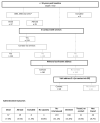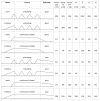Reappraising the long-term course and outcome of psychotic disorders: the AESOP-10 study
- PMID: 25066181
- PMCID: PMC4134320
- DOI: 10.1017/S0033291714000282
Reappraising the long-term course and outcome of psychotic disorders: the AESOP-10 study
Erratum in
- Psychol Med. 2014 Oct;44(13):2727
Abstract
Background: Studies of the long-term course and outcome of psychoses tend to focus on cohorts of prevalent cases. Such studies bias samples towards those with poor outcomes, which may distort our understanding of prognosis. Long-term follow-up studies of epidemiologically robust first-episode samples are rare.
Method: AESOP-10 is a 10-year follow-up study of 557 individuals with a first episode of psychosis initially identified in two areas in the UK (South East London and Nottingham). Detailed information was collated on course and outcome in three domains (clinical, social and service use) from case records, informants and follow-up interviews.
Results: At follow-up, of 532 incident cases identified, at baseline 37 (7%) had died, 29 (6%) had emigrated and eight (2%) were excluded. Of the remaining 458, 412 (90%) were traced and some information on follow-up was collated for 387 (85%). Most cases (265, 77%) experienced at least one period of sustained remission; at follow-up, 141 (46%) had been symptom free for at least 2 years. A majority (208, 72%) of cases had been employed for less than 25% of the follow-up period. The median number of hospital admissions, including at first presentation, was 2 [interquartile range (IQR) 1-4]; a majority (299, 88%) were admitted a least once and a minority (21, 6%) had 10 or more admissions. Overall, outcomes were worse for those with a non-affective diagnosis, for men and for those from South East London.
Conclusions: Sustained periods of symptom remission are usual following first presentation to mental health services for psychosis, including for those with a non-affective disorder; almost half recover.
Figures


Comment in
-
The onset and offset of psychosis--and what happens in between--a commentary on ‘Reappraising the long-term course and outcome of psychotic disorders: the AESOP-10 Study’ by Morgan et al. (2014).Psychol Med. 2014 Oct;44(13):2705-11. doi: 10.1017/S0033291714001378. Epub 2014 Jun 6. Psychol Med. 2014. PMID: 25066328
References
-
- Andreasen NC, Carpenter WT, Jr., Kane JM, Lasser RA, Marder SR, Weinberger DR. Remission in schizophrenia: proposed criteria and rationale for consensus. American Journal of Psychiatry. 2005;162:441–9. - PubMed
-
- Bleuler M. The Schizophrenia Disorders: Long-Term Patient and Family Studies. Yale University Press; New Haven and London: 1978.
-
- Burns T, Creed F, Fahy T, Thompson S, Tyrer P, White I, UK 700 Group Intensive versus standard case management for severe psychotic illness: a randomised trial. Lancet. 1999;353:2185–9. - PubMed
-
- Ciompi L. Catamnestic long-term study on the course of life and aging of schizophrenics. Schizophrenia Bulletin. 1980;6:606–18. - PubMed
-
- Cohen P, Cohen J. The clinician’s illusion. Archives of General Psychiatry. 1984;41:1178–82. - PubMed
Publication types
MeSH terms
Grants and funding
LinkOut - more resources
Full Text Sources
Other Literature Sources
Medical

